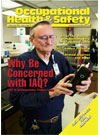
May 2007
- Why be Concerned with IAQ?
- Respiratory PPE for Cleanup Crews
- Armed Against the Heat
- Disposable FR Garments: What are the Differences?
Click here to subscribe.
Cover Story
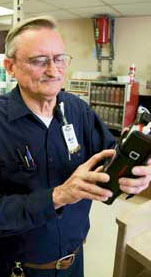
By Debra Weedon, Tim Lohrmann
ACCORDING to the National Human Activity Pattern Survey (NHAPS) as referenced by EPA, Americans spend about 90 percent or more of their time indoors. For this reason, the quality of our indoor air should be of great concern, whether it is in a home, a workplace, or a school, hospital, or medical facility--virtually any indoor environment. Poor indoor air quality can lead to a variety of health problems for any building occupant, especially at-risk populations (those younger than 2 or more than 70 years of age, immune system-compromised individuals, asthmatics, or those with severe allergies).
Features
By Jerry Laws
Why are heat and humidity such a threat to certain workers, such as those who work outdoors or in foundries?
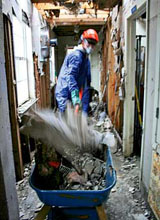
By Paul Puncochar, CIH
WHEN Hurricane Katrina slammed ashore in 2005, it helped drive home the fact that intense hurricanes are becoming a constant concern for residents along the Gulf Coast and Florida coastal regions. While no hurricane touched the U.S. coastline in 2006, that unusual respite is not likely to be repeated this year, according to a forecast issued by Colorado State University's forecasting team. The El Nino weather conditions that led to a quiet Atlantic hurricane season in 2006 will probably dissipate by summer, leading to above-average hurricane activity for 2007.
By Franklin Pichardo
EACH day, hazardous chemicals and potential risk of worker exposure is becoming a more complex challenge for many environmental, health and safety professionals. Statistics show that the respiratory condition in the workplace is one of the main cause of illness cases on the job (18,865 cases in 2003; 17,679 cases in 2004; and 20,128 cases in 20051).
By Christine L. Mello
CAPABLE of processing more than 36,000 bits of information an hour and utilizing more than 65 percent of the pathways to the brain, the human eye contributes nearly 85 percent of an individual’s total knowledge. Yet because the eye is often minimally protected, it is particularly vulnerable to injury--especially in the workplace.
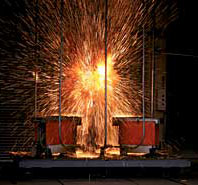
By Hugh Hoagland
ANY petrochemical worker or electrician exposed to electric arc has something in common with a meth lab cleanup team. Shawn Arbuckle of Denver's National Jewish Medical and Research Center describes the scene: "When we work in a cleanup, we don't know exactly what we'll be exposed to, but we do know the potential is there for fire and chemical exposure."
By Linda J. Sherrard
HEAT stress is occupational quicksand. By the time you realize you or your employees have a problem, it's too late! Heat-related problems often creep up on employees who may not realize the potential danger and be able to self-protect. It is up to the supervisor (and higher management) to ensure everyone knows the hazards and the approved precautions to safeguard everyone on the job site.
By Casey Hayes
OVER the years, great strides have been made in worker safety. Things have changed dramatically from the days when injuries, even deaths, were anticipated "costs" of progress and/or production. The true cost of worker injuries in terms of lost production, medical expenses, and human suffering eventually overtook the "you're lucky to have a job" mentality that pervaded the earlier part of the industrial age.
By Rod W. Amacher
AMID concern for profit and production, employee health is often overlooked in the occupational setting. One method of maintaining worker health is through the implementation of work site medical surveillance, which is the endeavor to ensure continued medical fitness of a worker through periodic examination and diagnostic processes. Several recent accounts of negligence in medical surveillance are offered.
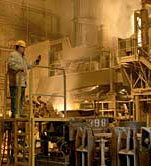
By Bill Smith
WHEN used independently of each other, the words industrial and hygiene could be construed as polar opposites. Industrial conjures up pictures of manufacturing plants, steel mills, production lines, and generally rough environments. Hygiene, on the other hand, is defined as a science of the establishment and maintenance of health.
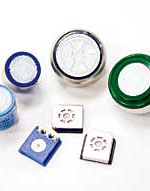
By William Ball
ADVANCEMENTS in safety gas detection sensor technology in the past few years have allowed dramatic reductions in the size and cost of personal multi-gas monitors, making it possible for employers to protect more workers against exposure to gas hazards in the workplace.
Departments
By Waldo Waldman
TWO minutes has passed since we had changed radio frequencies, and I still hadn't heard from my wingmen. My flight lead still had not checked me in. Was there a problem I didn't know about?
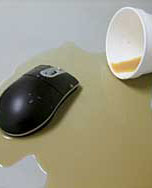
By Ronnie Rittenberry
SPILLS happen. You're reaching to turn a page or grab the stapler, and--oops! Depending on what kind of computer equipment you have, the resulting seepage of water, juice, mocha cappuccino, etc. into your mouse, keyboard, and other peripherals can vary from a momentary mop-up hassle to a work day-stopping disaster.
By Robert Pater
DO you want to propel your leadership ability to a higher level? In one of his last articles before passing away in 2005, management guru Peter Drucker wrote that leaders spent too much of their time trying to find the right answers when they should instead be focusing on formulating the right questions.
By Jerry Laws
SPRINKLER systems save lives and property. But should they be mandated for new homes? A key meeting May 21-26 in Rochester, N.Y., will decide this question, and home builders have massed their considerable political firepower to stop the mandate there.

By Fred Elliott
EFFECTIVE leaders are made, not born. As you rise to leadership status within your enterprise and/or the organizations in which you participate, you must enlist the help of others. Their contributions are vital to your own career success, and they compound the value you bring to the table. Delegation is a learned skill. It is making others responsible for on-time, on-budget, satisfactory delivery of work product while maintaining suitable control over the process and product. Your superiors want to see you do it well. How you reward will make this individual and others either more or less willing to help you the next time.